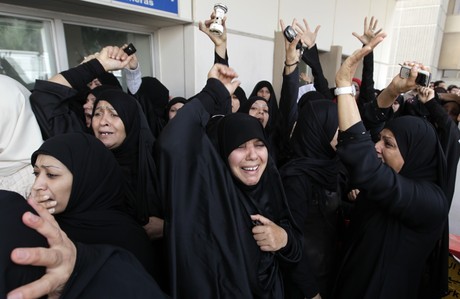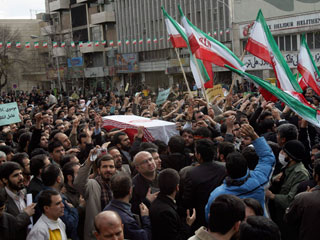Bahraini police tried to break up this morning the protest camp that has occupied the Pearl Plaza in downtown Manama. At least four people have been killed by the police, when security forces tried to end the demonstrations inspired by the uprisings in Egypt and Tunisia. According to witnesses, dozens tanks took to the streets to disperse the demonstrators who refused to leave, in protests that have lasted five days.
"The police are using tear gas against us," said a protester by telephone to Reuters. Another participant denounced the protests: "I'm hurt, I'm bleeding. They are killing us." Salamynia hospital has declared a state of disaster and treat dozens of protesters shot and hit by tear gas. Thousands of mostly Shiite demonstrators took to the streets this week demanding a greater say in the Islamic kingdom, where a Sunni family governs a majority Shiite population.
Hundreds of people remained camped in the square of the Pearl, an intersection in the capital that aims to become the basis of a similar protest which led to the downfall of the Egyptian leader Hosni Mubarak. The main opposition leader, Abdul Jalil Khalil, described the harsh police charges of "real terrorism." "Whoever made the decision to attack the demonstrators had a clear goal to kill," he asserted.
The American correspondent of the ABC television network, Miguel Marquez, has claimed that he has been attacked during the police crackdown on protesters in Bahrain. Al Wifaq, the leading opopsitor, representing the Shia community, said that the police used tear gas and rubber bullets to disperse thousands of protesters from the Pearl Plaza, in downtown Manama.
The protests were called to demand political reforms in that country. The ABC television hung on its website a radio interview Marquez, breathing and alert tone, describing in detail the direct clash between police and protesters. "I'm being attacked by a group of thugs. I'm in a place near our hotel, where people hide in fear in the buildings," Marquez explained in the article, which repeats his attackers a journalist.
"These people are not joking ... going to clear the square to prevent further protests on Friday. The Government clearly does not want this to grow," said Marquez. Marquez is the second journalist in recent days to be attacked while covering protests in the Arab world, which began in Tunis and later spread to Egypt and Bahrain and other countries now.
On Tuesday, thousands of people attended the funeral march, during which the remains were moved to Matrok Fadel, 31, to the cemetery. At Matrok died during the attack of security forces to those attending the funeral of another young victim of the fighting in the context of the protests on Monday.
Some protesters chanted slogans like "Down with the regime" during the funeral, according to some witnesses. However, most of those who participated in the protests that emerged earlier this week insisted that demand reforms and not regime change. The funeral march came a day after the king of Bahrain, Sheikh Hamad bin Isa al Khalifa, establish a special committee to investigate the cause of three days of protests, which resulted in the deaths of two people.
The king regretted casualties. Sheikh Hamad is favored as both offer dialogue to continue using the police to curb the protests. 


"The police are using tear gas against us," said a protester by telephone to Reuters. Another participant denounced the protests: "I'm hurt, I'm bleeding. They are killing us." Salamynia hospital has declared a state of disaster and treat dozens of protesters shot and hit by tear gas. Thousands of mostly Shiite demonstrators took to the streets this week demanding a greater say in the Islamic kingdom, where a Sunni family governs a majority Shiite population.
Hundreds of people remained camped in the square of the Pearl, an intersection in the capital that aims to become the basis of a similar protest which led to the downfall of the Egyptian leader Hosni Mubarak. The main opposition leader, Abdul Jalil Khalil, described the harsh police charges of "real terrorism." "Whoever made the decision to attack the demonstrators had a clear goal to kill," he asserted.
The American correspondent of the ABC television network, Miguel Marquez, has claimed that he has been attacked during the police crackdown on protesters in Bahrain. Al Wifaq, the leading opopsitor, representing the Shia community, said that the police used tear gas and rubber bullets to disperse thousands of protesters from the Pearl Plaza, in downtown Manama.
The protests were called to demand political reforms in that country. The ABC television hung on its website a radio interview Marquez, breathing and alert tone, describing in detail the direct clash between police and protesters. "I'm being attacked by a group of thugs. I'm in a place near our hotel, where people hide in fear in the buildings," Marquez explained in the article, which repeats his attackers a journalist.
"These people are not joking ... going to clear the square to prevent further protests on Friday. The Government clearly does not want this to grow," said Marquez. Marquez is the second journalist in recent days to be attacked while covering protests in the Arab world, which began in Tunis and later spread to Egypt and Bahrain and other countries now.
On Tuesday, thousands of people attended the funeral march, during which the remains were moved to Matrok Fadel, 31, to the cemetery. At Matrok died during the attack of security forces to those attending the funeral of another young victim of the fighting in the context of the protests on Monday.
Some protesters chanted slogans like "Down with the regime" during the funeral, according to some witnesses. However, most of those who participated in the protests that emerged earlier this week insisted that demand reforms and not regime change. The funeral march came a day after the king of Bahrain, Sheikh Hamad bin Isa al Khalifa, establish a special committee to investigate the cause of three days of protests, which resulted in the deaths of two people.
The king regretted casualties. Sheikh Hamad is favored as both offer dialogue to continue using the police to curb the protests.



- [ES] Hollywood Pushes New Laws Into Spain (19/12/2010)
- Bahrain's opposition steps up call for change (16/02/2011)
- Middle East update: What's happening in Bahrain, Yemen and Libya? (17/02/2011)
- VIDEO: Bahrainis call for end to abuses (16/02/2011)
- Concerns over Bahrain grand prix grow as GP2 practice is postponed (17/02/2011)
No comments:
Post a Comment